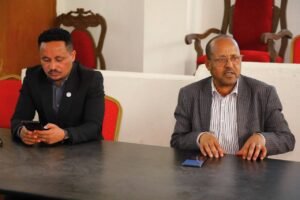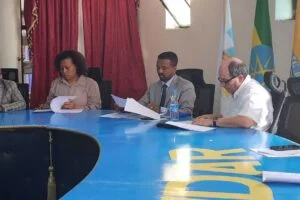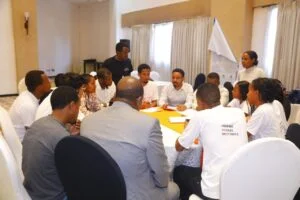International training at the University of Gondar

An international training on ‘new developments in the immunology, diagnosis and treatment of cutaneous and visceral leishmaniasis, Shcistosomiasis and Helmenth infections in an area of high tuberculosis prevalence’ was given at the University of Gondar from Feb/26 to March5/2017.
This training was organized by University of Gondar in collaboration with Bill and Melinda Gates Foundation, International Union of Immunological Society and University of Lausanne. The training was offered to the invited young researchers who are at their early stage of scientific carrier around the world. The training was given by senior scientists who are experts in the field. The training was focused on the new developments of immunology of the most neglected tropical diseases Leishmaiasis, Helmenth infections and Shcistosomiasis.

Dr. Asrat Atsedewoyin, academic vice president of University of Gondar, in his opening speech stated that he is very pleased and proud that University of Gondar hosts a very important international workshop. He added that University of Gondar is among the pioneer higher educational institution in Ethiopia. It has been working hard for the provision of quality of education, research and community engagement to bring sustainable socio-economic development to our country, Ethiopia said Dr. Asrat. He also noted that this especial training has brought a number of researchers from various countries and institutions. So it is believed that this training helps them to deepen their understanding of the nature of various tropical and infectious diseases. Moreover, he pointed out that this occasion helps them to share experience, and establish partnerships and collaborations with those senior scientists’ and young researchers’ universities and institutions.

According to Yegnasew Takele, a researcher at the University of Gondar Leishmaniasis Research and Treatment center and organizer of the training, the training focused on providing the students with the most recent scientific information on the immunology of these diseases and practical’s on grant writing to help the students to formulate a research question and write a grant for their future projects. The students have also presented their research findings on a poster and got a chance to discuss their future research projects with the senior scientists and some have got a chance to collaborate and work with these senior scientists.
In addition to these the invited guests and the students have visited the Hospital and the research centers of the University of Gondar. This has helped them to become familiar with the research and community services provided by the University. This will help to build future collaborations with the senior scientists to study public health problems in Gondar and the surroundings.

Dr Pascale Kropf from Imperial College London, honorary staff of University of Gondar and the lead organizer for the training have also said that University of Gondar is an ideal place to work on projects focusing on neglected tropical diseases. Sharing her research findings and experiences on leishmaniasis in Ethiopia, she mentioned that the disease is a problem in the country especially in the North West part of the country, where UoG is located. Therefore, future basic research will bring solutions for this big burden of the community. She presented an outstanding cutting age research findings on the immunology of human leishmaniasis that were done at the University of Gondar. She noted that these projects and collaborations were successful because of the support and willingness of the University officials to keep the University a leading University in the country and to make it internationally competitive institution. Finally, she said that the collaboration with her research team from Imperial College London and University of Gondar will continue in research and training.


Presenting about leishmaniasis on “a major public health problem in Ethiopia,” Professor Asrat Hailu said leishmaniasis is a parasitic disease spread by bites from infected sand flies. In most cases, it causes open sores on the skin (cutaneous leishmaniasis) but it can also infect and damage the organs (visceral leishmaniasis). The symptoms can take weeks or months to develop; hence this can lead to a delay in diagnosis, and in the case of leishmaniasis, the risk of severe scarring and destruction of tissue in the nose, finger, ear and troat. Visceral leishmaniasis, also known as kala-azar, causes high fever, substantial weight loss, swelling of the spleen and liver, and anemia. If left untreated, it is almost always fatal. According to the World Health Organization, around 12 million people are currently infected with leishmaniasis world wide, mostly in South America, Africa and Asia; there are an estimated 300,000 cases and 20,000 deaths every year.


Dr. Desalegn Menigesha, President of University of Gondar, on his closing speech appreciated Dr. Pascale Kropf and Mr. Yegnasew Takele for their hard working and organizing this especial international event. Dr. Desalegn Menigesha expressed that the event made them confident to prepare and host similar international workshops here at University of Gondar in the future. He also noted that this international training paved the way to create partnerships and collaborations with Universities and institutions around the world.
Finally, the group have visited historical places like Fasil Castle in Gondar Town and they all were happy and appreciate University of Gondar and Gondar Town. They mentioned that such international training will be organized in the future on other public health problems to create opportunities to young researchers to continue their research carrier.
Reported by: Yilak Alebachew
Edited by: Yetwale Mequanint




